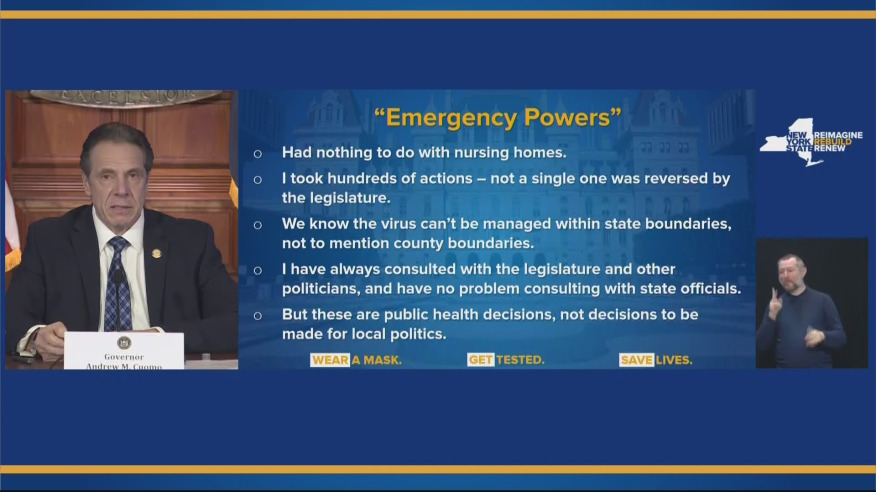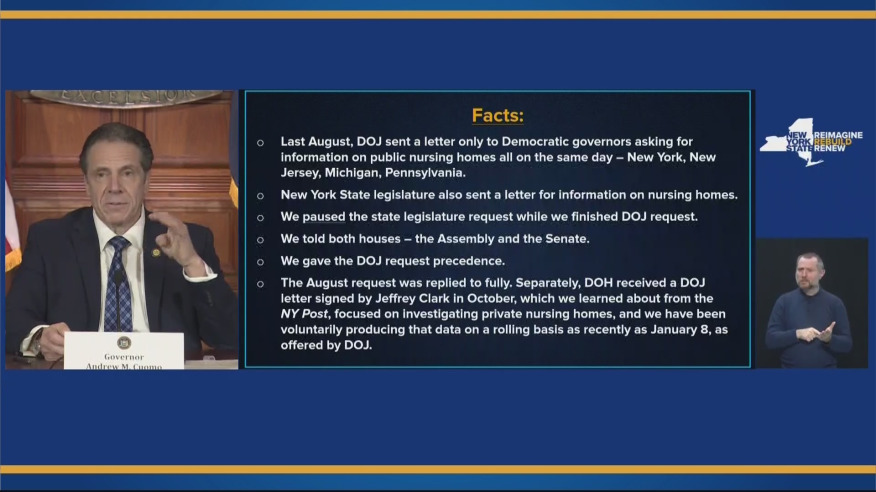Gov. Cuomo on New York nursing homes, COVID-19: ‘Everybody did the best they could’
ALBANY, N.Y. (NewsNation Now) — New York Gov. Andrew Cuomo, facing accusations that he covered up the true death toll of the pandemic on nursing home residents, held a briefing Monday on COVID-19 addressing the accusations and calls by some Republican lawmakers to strip him of his emergency powers.
State lawmakers last week called for investigations, seeking to strip Cuomo of his emergency powers and even calls for his resignation from a few Republicans after new details emerged last week about why certain nursing home data was kept under wraps for months, despite requests from lawmakers and others.
“Executive powers have nothing to do with nursing homes and the legislature can overturn executive measures,” Gov. Cuomo said. “We know the virus can’t be mandated within state boundaries or county boundaries. These are public health decisions, not decisions to be made for local politics. I get these are difficult decisions, but otherwise people die, and these decisions should not be politicized.”

The governor said facts have been distorted over the past year and he laid out a timeline of “facts” regarding the nursing home controversy:

“The DOH has fully and publicly reported all COVID-19 deaths in hospitals and nursing homes,” Gov. Cuomo said. “They have always been fully reported. 36% of all COVID deaths have been in nursing homes, and they make up less than 1% of the population. New York is No. 34 in nursing home deaths as a percentage of total deaths, and New York state is one of only nine states that count ‘presumed fatalities’ in nursing homes.”
The governor said there has been “much distortion” regarding a New York State Department of Health memo from March 25, 2020.
The governor said of 613 nursing homes, 365 received a person from a hospital. He said of those 365 nursing homes that received a patient from a hospital between March 25 memo, and the advisory being superseded on May 10, 98% had COVID-19 in their facility prior to when the patient was admitted.
“COVID did not get into the nursing homes by people coming from hospitals,” Gov. Cuomo said. “COVID got into the nursing homes by staff walking into the nursing home when they didn’t know they had COVID.”
It was a memo that included CDC protocols for sending hospital patients back to nursing homes, guidance that New York and a dozen other states followed.
“Senior citizens shouldn’t stay in a hospital longer than necessary because of the risk of a secondary infection,” Gov. Cuomo said.
The governor said the state has, and continues, to see guidance from medical professionals and scientists on COVID-19 decisions.
“These decisions are not political decisions,” Gov. Cuomo said. “They’re all made on the best information the medical professionals had at the time. I’ve said to the state many times, nobody has been here before, nobody knows for sure — COVID is new.”
The governor gave a vote of confidence for New York State Public Health Commissioner Dr. Howard Zucker.
“I would trust Dr. Zucker with my mother’s care,” Gov. Cuomo said. “That’s why I trust him with your mother’s care. I wouldn’t have anyone as the health commissioner I wouldn’t trust with my mother.”
The governor said the lessons learned over the past year will be important for the next pandemic.
“I have long believed there is a tension in for-profit nursing homes,” Gov. Cuomo said. “Do you want to hire more staff or make more profit? Do you want to buy more PPE or stockpile PPE, or do you want to make more profit? That tension is a problem that has to be resolved legislatively because I don’t want to leave it to these for-profit owners to decide what’s right and what’s wrong. COVID isn’t done with us. I believe it should be mandated how much you make should be put make into the facility. I believe that.”
The governor said if he could go back in time, things would have been done differently, but he said “everybody did the best they could.”
“The void we created was filled with skepticism, and cynicism, and conspiracy theories,” Gov. Cuomo said. “The void we created allowed disinformation and that created more anxieties for the families with loved ones. Love ones died alone. It was horrific.”
The governor said the last thing he wanted to do as governor was to “aggravate a terrible situation.”
“I accept responsibility. I am in charge,” Gov. Cuomo said. “I take responsibility. We should have provided more information faster. We were too focused on doing the job and addressing the crisis and we didn’t do a good enough job.”
However, Cuomo also took aim at “for-profit” nursing homes, which have been criticized for not investing in personal protective equipment for their staff early in the crisis.
“Those institutions are trying to make money. It’s too easy to sacrifice patient care,” Cuomo said. “We have to implement reform.”
He also tried to show more empathy to the families of the dead, who couldn’t be with their loved ones in their final hours.
“Loved ones died alone. It was horrific,” Cuomo said. “The void in information we created started misinformation.”
State Republican Chairman Nick Langworthy last week accused Cuomo of bungling the state’s response to the pandemic from the very beginning, hurting business, costing jobs and costing lives.
Initially, Langworthy was hoping to recall the governor by voter referendum, but that is not allowed by law in New York. Instead, some Republicans are demanding an investigation of the governor’s conduct by the U.S. Justice Department that could lead to criminal sanctions or impeaching him.
The state’s impeachment process is similar to what the country recently witnessed on a national scale. In New York, impeachment starts in the assembly, and a trial court is assembled for the proceedings.
The higher death tolls were divulged hours after a report late last month from Democratic state Attorney General Letitia James examined the administration’s failure to include nursing home residents who died at hospitals. The updated numbers backed up the findings of an Associated Press investigation last year that concluded the state could have been understating deaths by thousands.
The Associated Press and NewsNation affiliate WROC contributed to this report.














